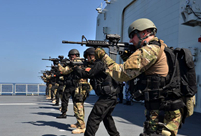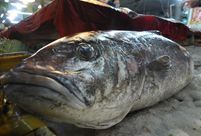 Bikini show in 2014 China Final of Miss Tourism World
Bikini show in 2014 China Final of Miss Tourism World
 Close-up view of August Aerobatic Team
Close-up view of August Aerobatic Team
 Goddesses married in 2014
Goddesses married in 2014
 Polar region photos raise worldwide awareness of global warming
Polar region photos raise worldwide awareness of global warming
 Get off at the last stop — Beijing Subway in vision
Get off at the last stop — Beijing Subway in vision
 Top 100 beauties in the world!
Top 100 beauties in the world!
 Gallery: Who is the most beautiful one?
Gallery: Who is the most beautiful one?
 If you like autumn, put your hands in the air!
If you like autumn, put your hands in the air!
 Fan Bingbing's "Queen style" in new play
Fan Bingbing's "Queen style" in new play
 Lingerie show at 2014 Miss China
Lingerie show at 2014 Miss China
BAGHDAD/DAMASCUS, Dec. 22 -- Violence by extremist groups such as al-Qaida and the rising Islamic State (IS) has continuously made news headlines in 2014 with bloody keywords.
As terrorists have carried out brutal executions of captives and threatened to break down the boundaries and political order in the region, these extremist groups have become a major factor in reshaping the region.
The rise of extremist ideology, Arab analysts said, which was partly due to Western military interventions in Muslim-dominated regions such as Iraq and Afghanistan, was exacerbated during the so-called Arab Spring uprisings and has shown no sign of abating.
ESTABLISHMENT OF ISLAMIC STATE
Since NATO-led military action toppled former Libyan leader Muammar Gaddafi in 2011, Libya has been embroiled in internal political strife and its large swathes of soil are controlled by al-Qaida and other radical groups.
In the Middle East, the notorious Islamic State militants' might has crossed the borders and posed an imminent threat to the fabric of the societies in the Arab world, whose establishment could date back to 2006 when al-Qaida announced the creation of Islamic State in Iraq (ISI).
In early 2013, the ISI entered Syria and participated in the civil war against the government of Syrian President Bashar al-Assad. It later declared its merger with an al-Qaida-linked group in Syria, known as al-Nusra Front, under the new name of Islamic State of Iraq and Levant (ISIL).
In February 2014, the al-Qaida organization said it had cut links with the militant group ISIL led by Abu Bakr al-Baghdadi. In June 2014, the ISIL, which had seized large areas in Syria and Iraq, declared the establishment of the caliphate Islamic rule and changed its name to IS.
"The declaration of a caliphate was a major move because it would lure the extremist Islamic groups and those who are ideologically close to announce allegiance to Abu Bakr al-Baghdadi and that's what happened with some groups from Libya, Egypt, Tunisia, Yemen, and other areas," Ibrahim al-Ameri, a lecturer of politics in a Baghdad college told Xinhua.
Al-Ameri said that both the IS and al-Qaida are based on the same intellectual and ideological system, but the IS tend to be more violent, even in its dealing with other opponent Islamic groups.
"The IS seemed more brutal in dealing with its detainees and made many mass executions and decapitations against soldiers and security members, whether in Syria or in Iraq," al-Ameri said.
EXTREMIST GROUPS RISE AMID INTERNAL CHAOS, EXTERNAL INTERVENTIONS
Terrorism cannot thrive without a suitable environment. Unfortunately, social and economic issues, mainly poverty, ignorance and high rates of unemployment in the Arab region serve as an excellent breeding ground for terrorism.
The Iraqi government had failed to bring stability to the country as it placed sectarian and political strife before good governance.
"(Former Iraqi Prime Minister Nouri) Maliki's approach toward Sunnis pushed the al-Qaida group which rebranded itself as Islamic State to intensify attacks on Shiite community and the Iraqi state. Once again, Iraq's disappointed Sunni majority areas became fertile recruitment grounds for the terrorist group," Najib al-Jubouri, a political commentator, said.
Moreover, the West played a major role in supporting and creating the Islamic State militants in the Arab world," Hmaidi Abdullah, a Syrian political analyst said.
"The West and the United States have relied on terrorist groups ... the U.S. invasion of Iraq had pushed the terrorist groups to re-emerge. The Arab Spring, which erupted in 2011, also pushed radical groups to flourish owing to violence that had ensued," he said.
He added that Western countries supported extremist groups in Syria in an attempt to bring down al-Assad, a repeat of what they had done in Afghanistan in the face of Soviet Union.
Abdullah said the United States and its allies have not really intended to bring democracy to the region. They simply sided with whatever parties that could advance their interests, he said.
Al-Jubouri agreed with him, saying such situations created breeding grounds for terrorism.
The emergence of al-Qaida and the IS is the result of imbalance in the relations between the Islamic world and the United States, and the result of lack of peaceful options in correcting such imbalances, al-Ameri said.
Unilateralism by the United States after the 9/11 attacks in 2001 sowed the seeds for violence which would not be unrooted in decades, he said.
For his part, al-Jubouri also blamed the United States for adopting double standards in global issues.
"The Americans apparently have their own set of rules to define the act of terrorism and then use it as a lame excuse to interfere in other country's internal affairs," he said.
COMPREHENSIVE APPROACH NEEDED TO DEFEAT TERRORISM
To defeat the IS and other terrorist groups in the region, there must be a comprehensive international strategy.h "There is internal and external approaches to defeat the IS in Iraq and the world. As for the Iraqi government it is important to bring peace and tranquility to the country militarily, but it is more important to launch political dialogue among all Iraqi factions, and to ensure equal access to opportunities for all Iraqis," al-Ameri said.
"It has to be done if the Iraqi government intends to end the violence cycle, sectarian and ethnic conflicts," he said.
In the meantime, the United States should not be a self-styled leader in the fight against terrorism because it has long been adopting double standards toward different world issues, he added.
"The United States should work within the system of the United Nations, not unilaterally," he said.
Western policies should be overhauled in order to have honest cooperation in the battle against terrorism. Otherwise Western powers would suffer the consequences of terrorism when the radical groups take hold and further thrive in the Arab region, he warned.
Maher Murhej, the head of the Syrian Youth Party, also said "Western countries must consider their policies in the Middle East. Otherwise, they will bear the brunt of creating a big monster who will be hard to be kept in a certain geographical area.... We see that the Islamic State has already put maps for conquering Europe."
The United Nations and its security body should play a leading role in the global fight against terrorism, Al-Jubouri stressed, adding that it is the only way to maintain unity, achieve effective coordination and take concerted actions.
 Joint anti-piracy drill
Joint anti-piracy drill Unknown 'monster' fish caught in Shandong
Unknown 'monster' fish caught in Shandong 20 years on: Relocated Three Gorges residents through lens
20 years on: Relocated Three Gorges residents through lens Beautiful Chinese woman
Beautiful Chinese woman Chestnut girl goes viral online
Chestnut girl goes viral online PLA HK Garrison veterans leave behind beautiful smiles
PLA HK Garrison veterans leave behind beautiful smiles Victoria's Secret Fashion Show
Victoria's Secret Fashion Show Representative beauties
Representative beauties Excellent photos of Zhuhai Air Show
Excellent photos of Zhuhai Air Show AIDS response for expats
AIDS response for expats China set to lower GDP growth target
China set to lower GDP growth target Fake euros popular on Taobao
Fake euros popular on Taobao How long can Russia withstand the crisis?
How long can Russia withstand the crisis?Day|Week|Month